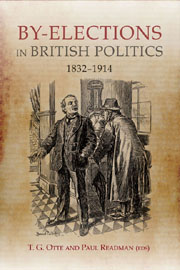Book contents
- Frontmatter
- Contents
- List of Figures and Tables
- List of Contributors
- Preface and Acknowledgements
- List of Abbreviations
- Introduction
- 1 ‘Plumping Contests’: The Impact of By-elections on English Voting Behaviour, 1790–1868
- 2 Government Appointment By-elections: 1832–86
- 3 ‘We should have had 1,000’: The By-elections of the 1874 Parliament
- 4 ‘The Glamour of Independence’: By-elections and Radicalism during the Liberal Meridian, 1869–83
- 5 ‘The Swing of the Pendulum at Home’: By-elections and Foreign Policy, 1865–1914
- 6 By-elections and the Modernisation of Party Organisation, 1867–1914
- 7 ‘A Terrific Outburst of Political Meteorology’: By-elections and the Unionist Electoral Ascendancy in Late-Victorian England
- 8 Land Reform and By-elections, 1885–1914: Do By-elections Matter?
- 9 Edwardian By-elections
- 10 Lloyd George, Limehouse and the Realignment of British Politics: The Bermondsey By-election of 1909
- 11 By-elections and the Peculiarities of Scottish Politics, 1832–1900
- Index of By-election Contests
- General Index
5 - ‘The Swing of the Pendulum at Home’: By-elections and Foreign Policy, 1865–1914
Published online by Cambridge University Press: 05 May 2013
- Frontmatter
- Contents
- List of Figures and Tables
- List of Contributors
- Preface and Acknowledgements
- List of Abbreviations
- Introduction
- 1 ‘Plumping Contests’: The Impact of By-elections on English Voting Behaviour, 1790–1868
- 2 Government Appointment By-elections: 1832–86
- 3 ‘We should have had 1,000’: The By-elections of the 1874 Parliament
- 4 ‘The Glamour of Independence’: By-elections and Radicalism during the Liberal Meridian, 1869–83
- 5 ‘The Swing of the Pendulum at Home’: By-elections and Foreign Policy, 1865–1914
- 6 By-elections and the Modernisation of Party Organisation, 1867–1914
- 7 ‘A Terrific Outburst of Political Meteorology’: By-elections and the Unionist Electoral Ascendancy in Late-Victorian England
- 8 Land Reform and By-elections, 1885–1914: Do By-elections Matter?
- 9 Edwardian By-elections
- 10 Lloyd George, Limehouse and the Realignment of British Politics: The Bermondsey By-election of 1909
- 11 By-elections and the Peculiarities of Scottish Politics, 1832–1900
- Index of By-election Contests
- General Index
Summary
To group electoral politics and foreign policy together must, at first glance, appear quixotic. It certainly runs against established historiographical verities. Diplomatic historians are wont to assert the separation of the British state's external activities from the domestic preoccupations of its political elite. Thus, James Joll, in his magisterial survey of the origins of the First World War, concluded that, in sharp contrast to the continental Powers, any link between domestic affairs and foreign policy decision-making is well-nigh impossible to establish. At the same time, all too often, in all too many accounts of British history in the long nineteenth century, the many foreign complications that plagued policy-makers appear as little more than irritating, irrelevant even, intrusions that may safely be swatted aside.
The tide, however, has now begun to turn. If Marvin Swartz's study of the 1870s did not quite find the echo that it deserved, a range of recent studies have tackled the ‘high politics’ of foreign policy, primarily in the mid-Victorian period. For the eighteenth century, Jeremy Black has emphasised the significance of public debate in framing and shaping policy. To appreciate that significance, it is necessary to consider the complexity of political resonances that certain concepts or issues had acquired for Hanoverian politicians within a broader framework of Britain's evolving strategic culture. Spanning a longer period from the eighteenth century to the inter-war period in the twentieth century, albeit in a specifically English context, Miles Taylor's examination of the iconography of John Bull has shown how public discourse at sub-élite levels reflected contemporary concerns about external affairs.
- Type
- Chapter
- Information
- By-Elections in British Politics, 1832-1914 , pp. 121 - 150Publisher: Boydell & BrewerPrint publication year: 2013

